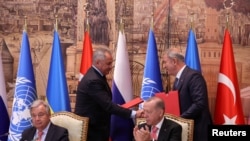Russia, Ukraine, NATO member Turkey and the United Nations signed a landmark deal on Friday to unlock Ukrainian grain and fertilizer exports from Black Sea ports, to help relieve a growing food crisis worsened by the war.
The United Nations and Russia also signed an memorandum of understanding committing the U.N. to facilitating unimpeded access of Russian fertiliser and other products to global markets. "The aim of these agreements...is to provide some kind of solace to the global south," said one of the U.N. officials.
The deal ensures safe passage in and out of Odesa and two other Ukrainian ports in what the official called a "de facto ceasefire" for the ships and facilities covered.
The deal is valid for 120 days and the United Nations expects it to be renewed unless the war has ended by then. Work is to get underway immediately to establish inspection teams and staffing a Joint Coordination Center (JCC) in Istanbul overseen by members of all four parties to the agreement.
Ukrainian ports require about 10 days to prepare, so it will take a few weeks before vessels are moving in and out. "We are looking at a very quick rate of implementation," the official said.
Though Ukraine has mined the nearby waters as part of its war defences, there is no further need for de-mining. Rather, Ukrainian pilots will guide the ships along safe channels in its territorial waters, with a minesweeper vessel on hand as needed but no military escorts.
Monitored by the JCC, the ships then transit the Black Sea to Turkey's Bosphorus strait and off to world markets.
All sides have agreed there will be no attacks on these entities. If a prohibited activity is observed, it will be the task of the JCC "to resolve it", the official said without elaborating.
In response to Russian concerns about ships delivering weapons to Ukraine, all returning ships will be inspected at a Turkish port by a team with representatives from all parties to the agreement and overseen by the JCC. The teams will board vessels and assess its cargo before it can return to Ukraine.
To allay concerns of ship insurers, the United Nations spent more than two months negotiating with the sector to ensure the plan was commercially viable and will not lead to punitive premiums.
The International Maritime Organization has been encouraging the private sector to play a role in the deal, and Western governments have issued statements saying companies will not fall afoul of sanctions imposed on Moscow. "The clarifications that the U.S. and EU have been issuing are very important for the private sector," said a second senior U.N. official.
Negotiations began in April when U.N. Secretary-General Antonio Guterres raised the idea in separate meetings with Russian President Vladimir Putin and Volodymyr Zelenskiy of Ukraine.
The grain talks were held in Istanbul at the invitation and urging of Turkish President Recep Tayyip Erdogan, along with UN Secretary General Antonio Guterres.








